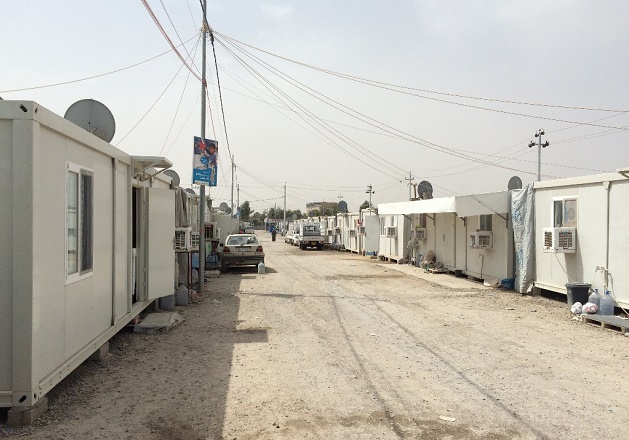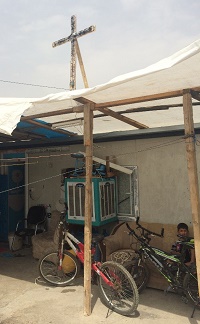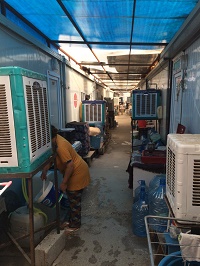Jan Dezort, of Generation 21, analyses the frustrations and success stories of a relocation programme for Middle Eastern Christian refugees in the Czech Republic.
 Images of a refugee camp in Iraqi Kurdistan from where some of the families relocated to the Czech Republic stayed. / J. Dezort
Images of a refugee camp in Iraqi Kurdistan from where some of the families relocated to the Czech Republic stayed. / J. Dezort
Generation 21 is a foundation in the Czech Republic established specifically to facilitate the rescue of persecuted Christians by helping them obtain asylum and move to the Central European country.
One of the most significant challenges the entire project faced was obtaining permission for the scheme from the Czech government. After moving 89 of a planned 153 individuals into the country, a little over half elected to either return to the Middle East or attempted to flee further into Germany.
As a result, the Czech government canceled permission for the program, allowing 35 individuals to remain but ending the possibility of any more people arriving through this particular project.
Now that the swirl of confusion and controversy has quieted down, we had the opportunity to speak with Jan Dezort, a lawyer who assisted with the project, about the present state of affairs.
 Jan Dezort.
Jan Dezort.Question. Tell us a little about your background. How did you come to be involved in Generation 21?
Answer. I was blessed with a good career, and I was thinking and praying about how I could donate some of my time to help with some good cause. It was at this time I learned about Generation 21 and was able to offer my services.
Q. How has the project to relocate refugees in the Czech Republic worked out?
A. The original goal was to help at least some displaced Christians relocate to the safety of the Czech Republic. This idea was regarded by many as a naive or impossible dream. However, this original goal was accomplished. Some people may not like this activity but no-one can argue it is not possible anymore. We have shown that it is.
I remember when I traveled to Iraq to meet some of the displaced people we eventually helped to move. They were people, like me, but I could travel there and back and they had no way to get out. They were staying in metal caravans in a refugee camp just few miles from an airport. The only difference between us was they had a different passport in their pocket. A year and half before I met them some of them had fine lives - they had homes and cars and jobs. Now deprived of that, they lived with the pain of what happened to them and in uncertainty about what was to come. The fact that they live and work [in the Czech Republic] now is like a dream.
As we worked on the goal to help at least some, we made a list of 153 people (including children) who asked the Czech government to be relocated. This was actually more than we had originally envisaged. We could not promise them anything, but we hoped to help all of them. It took many months before the relocation took place. Some of them got to other safe countries before our government approved the relocation, others changed their mind or decided not to relocate for different reasons. When I heard of a couple we dropped from the first list because they informed us they made it to Europe another way, I was happy that at least two of the 153 are in a safer place.
 Refugee camp in Iraqi Kurdistan. / J. Dezort
Refugee camp in Iraqi Kurdistan. / J. DezortI was relieved, and yet also felt there were 151 left to be helped. Among the 89 who finally did arrive in the Czech Republic was every person from that original list who fulfilled the conditions of the program and kept their name on the list. Even though some people from our original list changed, we were allowed to add people on the list as to keep the total at 153 refugees. Our altered goal was therefore to bring a total number of 153 Christian refugees to the country. Some of these could not relocate as the program was halted by the government when some of those who had arrived earlier decided to cancel their asylum status and relocate to a third country or to return to Iraq.
So this altered goal to relocate 153 people was not achieved. 89 got here, 65 did not. Out of those, 10 had their security vetting ready. Nine of those who were ready to go were denied just few days before the flight, and one person was supposed to arrive later.
Then 55 others could not come. Their vetting was not ready and they still had about one or two months before they could depart. All these 65 who did not arrive were not on the original list of 153 candidates for relocation. They were substitutes.
Out of the 89 who arrived, one extended family of 25 left for Germany, two extended families (30 persons) returned to Iraq and 34 persons stayed, joined by one relative from Germany. That makes 35 refugees staying in the Czech Republic right now.
They went through 4 month of intensive Czech language courses. All of them live in flats or houses. Some of them now work (IT, catering, driver, carpenter, paramedic, etc.), one person is of retirement age. Some are now searching for work. All the children go to school.
Q. What has been the greatest success so far?
A. That is a difficult question, because how do you measure it? Our perspective is constantly changing – when the people first came, six months ago, today, six months from now what will happen? I believe that if we do what God asks us to do, that is enough. What is His perspective?
I can tell you two good stories. One refugee told me his story about making a ‘deal’ with God when people were telling him he needed to take his family out of Iraq. He told God that he would leave but only if it would be directly from Iraq, with his entire family, and only if someone else made all the arrangements. His nine-year-old daughter asked in prayer, “Jesus, what will there be for us in the Czech Republic?” The answer she received was, “I will not disappoint you.” The father concludes, “Sometimes I think God did this whole project just to help me and my family relocate.”
Another refugee is a carpenter. He started a makeshift carpentry workshop with his sons in the refugee camp. He was informed by the authorities that he had to shut down his workshop one day before departing for relocation in the Czech Republic. When they got to the Czech Republic, his son was able to find part-time work as a carpenter.
But it is hard to say what is the greatest success, because all the situations are different and the situations change.
There is a lady who works for a catering firm and starts her shift at 5:00 AM in the morning. She was given the option to come later in the beginning, but she declined in order to show she wants to work under the same conditions as others and not receive special treatment.
There is a young boy who was in a team of three pupils that won a school competition in mathematics. They advanced to a Prague city level competition where they represented their elementary school and did well. He went for a one week school trip to ski in the mountains for the first time in his life, and came back enthusiastic. There are many nice integration stories.
Q. If somehow it becomes possible to bring in more refugees, would you want to do anything differently?
A. The hard truth is that we could try to do many things differently, but it would not guarantee a different result. You could invest ten times more time, experts, money, and other resources but the results could be the same. I think it is important to emphasize the uniqueness of this situation: the conflict that led to the need to relocate these people has changed even now, as has the window of opportunity.
And who can say how any of us would react in such a situation? You are torn away from your home, your job, the prestige of your education or your age, forced to live in primitive conditions in the camps. In some cases you have seen your loved ones killed, maybe you yourself have been tortured. You can think in your mind that you will respond a certain way, and then surprise yourself at what you do.
 Refugee camp in Iraqi Kurdistan. / J. Dezort
Refugee camp in Iraqi Kurdistan. / J. DezortEurope is so different from the Middle East. There are big cultural differences – not just the climate and food and language. For example, a big question is whether or not to bring older grandparents. They are often the ones who have the most difficult time adjusting, and decide to go back, despite the danger of doing so. But the elders of the family have tremendous importance in Middle Eastern culture, and their decisions are respected. So we have a dilemma – even a moral dilemma. Is it better to bring them once the younger family members have time to settle in? But what if they are going to suffer if they remain in a dangerous place, facing persecution?
Because of the uniqueness of the situation and the cultural differences, it is very difficult to manage everyone’s expectations. One idea involves signing an “integration contract” before relocation, with detailed “entitlements” and “duties.” But in the stress of such a situation, with no way to predict how someone will respond to the different place and difficulties faced in relocation, means that these contracts may not appear to be of much help.
I think we need to avoid the trap of perfectionism. It is not possible to accomplish everything perfectly in this kind of unique situation. We were able to seize an opportunity to help, and we tried to do the best with what was necessary in the moment.
Q. Are there any specific misconceptions about the work of Generation 21 that you would like to clear up?
A. Because we decided to specifically help persecuted Christians does not mean that we were or are in any way against Muslims. We chose to help relocate people who were asking for help, and sometimes need to explain that by bringing Christians who asked for help we did not discriminate or break any Czech constitutional rules.
Another area of misunderstanding has to do with those who chose to go back. People may choose to return to a dangerous place because the cultural shock is too big. There is a normal phase of frustration that is always to some extent part of any relocation process. It does not prove they were not in danger. People in these situations do not always behave rationally and find it difficult to explain their own actions.
Q. What advice would you offer to other organizations attempting to help refugees relocate?
A. Again, this is difficult because each situation will be unique. Be patient, be prepared for the people who want to go back. Be ready to handle a great deal of misunderstanding from the news media. Also, I think it is important for us not to be naive.
I think in some cases there was an idea that because these people are Christians, everything would somehow just amazingly work out. But these are still people, and they are coming from a hard situation into a challenging situation, and just because they are Christians does not mean they will automatically be able to get along well in such a different culture.
Q. What are the ongoing needs for the refugees who are now getting settled in?
A. There are some who are still looking for jobs. They need help to improve their Czech language skills and access to advanced Czech language courses. Some of the families in Prague really need larger flats to rent. A family is searching for a flat to rent in the town of Trinec, where they have a job opportunity.
One specific thing is walnuts. They are an essential part of Iraqi cuisine but relatively expensive in the Czech Republic. If someone knows about a cheaper source of supply that would help. A man from our group living in Prague wants to start a small business of selling refreshments in a food stall and wants to hire a local person to provide advice so that he can comply with local rules and regulations. The children are doing remarkably well.
Q. How can people most appropriately help with these current needs?
A. “Our” refugees from Generation 21 are well cared for compared to others coming here from different backgrounds. People can help by being aware. Refugees from all backgrounds need friends in their new home. Most need help finding accommodation and work. Liaise with those helping refugees. Don’t be afraid to offer friendship and help.
Visit the website of Generation 21 if you want to help with any of the current needs or learn more about the project.

Las opiniones vertidas por nuestros colaboradores se realizan a nivel personal, pudiendo coincidir o no con la postura de la dirección de Protestante Digital.
Si quieres comentar o